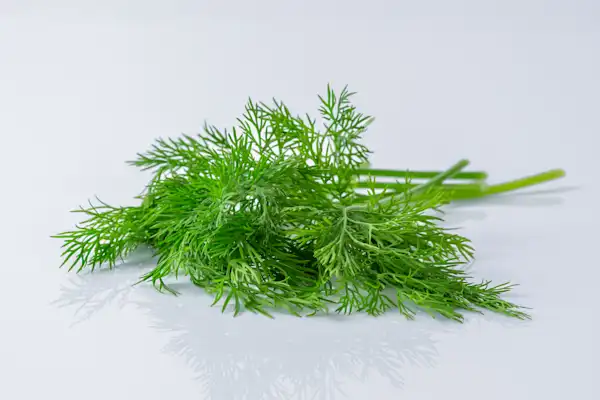Access our First Foods® Database in the Solid Starts App.
Learn moreDill
Herb/Spice
Age Suggestion
6 months
Iron-Rich
No
Common Allergen
No

When can babies have dill?
Dill may be introduced as soon as baby is ready to start solids, which is generally around 6 months of age.
Dill comes from the lands around the Mediterranean Sea, where it has long been cultivated for its medicinal and culinary uses. Both its seeds and delicate lacy fronds are edible, lending a citrusy taste and fresh aroma to sauces, soups, stews, and more.
How do you serve dill to babies?
Every baby develops on their own timeline, and the suggestions on how to cut or prepare particular foods are generalizations for a broad audience.
6 months old +:
Finely chop fresh dill and incorporate into age-appropriate dishes for baby, like a dressing for cooked vegetables or a sauce for meat. As long as the stem of the plant is soft, you can finely chop the stem along with the leaves. If the stem has gotten woody and tough, remove the leaves from the stem before preparing. Alternatively, use dried dill or dill weed powder to flavor food.
12 months old +:
Use fresh, dried, or powdered dill weed as you normally would in dishes, even if a recipe calls for larger pieces of dill fronds. Just keep in mind that any larger pieces of dill may cause toddlers to gag or cough a little. Keep an open cup with water or milk on hand and encourage the toddler to take a sip if a bit of dill gets uncomfortable.
Videos
Is dill a choking hazard for babies?
No. Dill presents a low risk when safely prepared for a child’s age and developmental ability, though, in theory, an individual could choke on any food. To reduce the risk, prepare and serve dill in an age-appropriate way as described in the How to Serve section. As always, make sure you create a safe eating environment and stay within an arm’s reach of baby during meals.
Learn the signs of choking and gagging and more about choking first aid in our free guides, Infant Rescue and Toddler Rescue.
Is dill a common allergen?
No. Allergies to dill are not common, but rare cases have been reported, some of which were severe.
Individuals with Oral Allergy Syndrome (also known as pollen food allergy syndrome), particularly those who are allergic to birch or mugwort pollen and/or sensitive to foods within the Apiaceae family (such as carrot, celery, coriander, cumin, and fennel), may also be sensitive to dill as it is part of the Apiaceae family. Oral Allergy Syndrome typically results in short-lived itching, tingling, or burning in the mouth and is unlikely to result in a dangerous reaction. Cooking dill may help minimize the reaction.
Dill has also been associated with contact rashes from household and occupational exposure, along with phytophotodermatitis (a hyperpigmented, occasionally blistering rash that develops on skin exposed to both the plant allergen and UV light). If baby has sensitive skin and a tendency to develop contact rashes, be sure to wash the child’s hands and face after prolonged contact with dill.
As you would when introducing any new food, start by offering a small quantity for the first few servings. If there is no adverse reaction, gradually increase the quantity over future meals.
Is dill safe for babies?
Yes, dill is generally recognized as safe in amounts typically used in cooking. Dill essential oils should be avoided for babies, as research on their use and safety in babies and young children is limited.
Is dill healthy for babies?
Yes. Dill offers small amounts of a variety of vitamins, minerals, and fiber, including a dash of vitamin C. It also contains a number plant compounds like phenolic acids and flavonoids, which may offer digestion-supporting, antimicrobial, and antioxidant properties.
Does baby need a high chair?
While a high chair can help create a safe eating environment, there are alternative ways for baby to eat safely, such as holding the child on your lap or sitting together on the floor. For more information, see our article on high chairs.
What are the signs of readiness for solids?
Baby should be able to sit with minimal support, hold their head up well, and be able to reach and grab an item and successfully bring it to their mouth while seated. Baby should also show interest in eating and watching caregivers eat. For example of babies who are ready vs not, see our article on readiness.
Our Team
Written by
Expert Tips Delivered to Your Inbox
Sign up for weekly tips, recipes and more!
Copyright © 2026 • Solid Starts Inc





